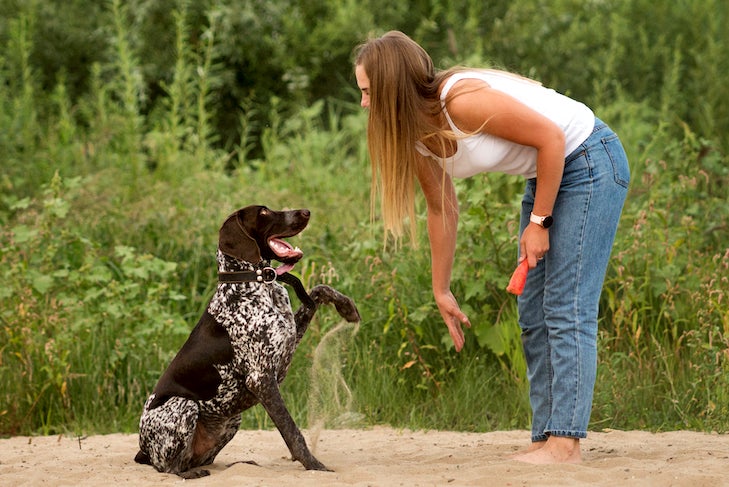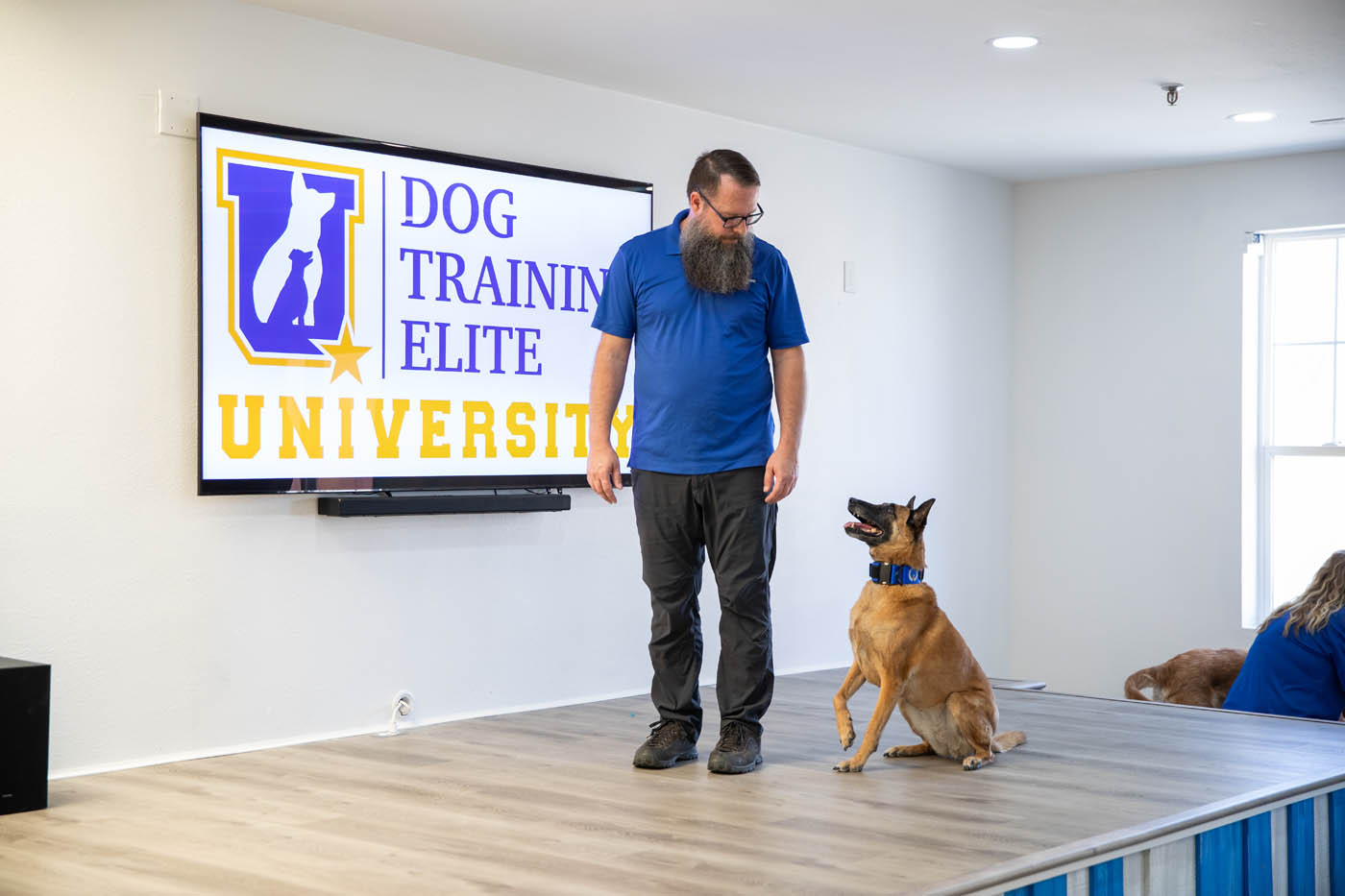Unleash Potential with Dog Training Near Me: Discover Your Local Specialists
Unleash Potential with Dog Training Near Me: Discover Your Local Specialists
Blog Article
Unlock Your Canine's Prospective: Proven Canine Training Strategies for Success
Efficient pet training is a nuanced procedure that pivots on comprehending canine habits and using scientifically backed methods. By integrating positive support, developing clear commands, and prioritizing socializing, pet owners can grow a productive partnership with their pets.
Understanding Dog Habits
Comprehending pet actions is essential for reliable training and promoting a favorable relationship in between dogs and their owners. An extensive grasp of canine body movement, articulations, and social communications is essential for acknowledging their requirements and emotions. Dogs interact mainly through non-verbal cues; for example, a wagging tail may indicate excitement, while pinned ears can indicate fear or submission.

Additionally, environmental factors play a considerable duty in forming a pet dog's behavior. Adjustments in routine, brand-new environments, or the visibility of strange people can bring about stress and anxiety or anxiety in canines. Acknowledging these triggers enables owners to alleviate adverse responses and establish appropriate training methods.
Inevitably, a deep understanding of pet habits lays the structure for effective training techniques, enhancing both behavior and the general bond between the pet and its owner. dog training charlotte. This knowledge is crucial for cultivating a well-adjusted, pleased canine companion
Favorable Support Strategies
Reliable training depends heavily on favorable support techniques, which have been revealed to generate considerable results in shaping preferred behaviors in canines. This strategy includes awarding a pet dog for showing details habits, therefore boosting the possibility that these habits will certainly be repeated. Incentives can take different types, including treats, appreciation, toys, or playtime, relying on what inspires the individual pet dog.

It is important to progressively eliminate benefits as the canine learns the habits, transitioning to recurring support. This method preserves the behavior with time while preventing reliance on continuous rewards. By concentrating on favorable reinforcement, trainers can cultivate a relying on partnership with their pets, promoting a healthy and balanced and participating training atmosphere that improves general obedience and efficiency.
Establishing Regular Commands
A fundamental facet of successful canine training is the establishment of consistent commands. Uniformity in commands is crucial for reliable interaction between the instructor and the canine. When commands are consistent, canines discover to connect specific words with preferred actions, which accelerates the training process and improves understanding.
To develop regular commands, it is essential that all family members utilize the exact same terms and gestures. If one individual utilizes "rest" while one more claims "sit down," it can create complication for the pet. Select clear, unique words for commands and guarantee every person included in the pet dog's training abides by these options.
Additionally, rep is vital. Strengthen commands through constant method, making certain that the pet dog gets ample chances to react correctly. When a canine successfully follows a command, instant favorable support must comply with. This might be in the form of deals with, appreciation, or playtime, solidifying the connection between the command and the activity.
Last but not least, be individual. Developing consistent commands requires time and effort. With commitment and clarity, you will certainly aid your dog establish a strong understanding of assumptions, inevitably bring about a mannerly companion.
Socializing and Direct Exposure
Mingling a canine is important for cultivating a well-adjusted and certain companion. This procedure involves exposing your pet to a variety of environments, Click This Link people, and other animals to create their social abilities and flexibility. Early socializing, ideally in between the ages of 3 to fourteen weeks, is essential, as it lays the foundation for a canine's future behavior.
Throughout socializing, objective to provide favorable experiences in different setups, such as parks, active roads, and homes with other family pets. Present your dog to various stimulations, including audios, views, and smells, ensuring that each experience is rewarding. This exposure aids mitigate worry and stress and anxiety, leading the way for a more durable pet dog.
Engaging in controlled team play sessions with various other canines can likewise enhance social skills, educating your pet dog proper interactions and limits. Prioritizing socialization will substantially add to your pet dog's total happiness and actions throughout their life.
Conquering Common Educating Challenges

Pets might have a hard time to concentrate in active or unfamiliar setups. Gradually desensitize your dog to disturbances by starting training in a quiet environment and slowly presenting more stimulations as they end up being competent.
In addition, behavioral issues like leaping or too much barking can become irritating. Address these by educating alternate habits, such as sitting calmly when greeting guests. Uniformity and patience are crucial; strengthen preferred behaviors continually and prevent abuse, which can bring about confusion.
Last but not least, identify that each pet is special, and training timelines may differ. Dressmaker your technique to your pet's private needs, and seek specialist advice if required. With willpower and the best methods, getting over these obstacles can bring about a well-trained, delighted canine companion.
Verdict
Finally, opening a dog's prospective demands a comprehensive strategy that integrates an understanding of canine behavior, the application of positive home support methods, and the establishment of regular commands. Early socializing and exposure to diverse environments additionally improve a dog's flexibility and self-confidence. By attending to typical training obstacles with customized strategies and patience, a cooperative and harmonious connection between pet and trainer can be promoted, ultimately causing Click Here a mannerly buddy efficient in thriving in different scenarios.
Efficient dog training is a nuanced process that pivots on comprehending canine behavior and utilizing medically backed techniques.Recognizing pet habits is essential for efficient training and promoting a favorable partnership in between pet dogs and their proprietors.Reliable training counts heavily on positive reinforcement strategies, which have been shown to yield considerable outcomes in forming wanted behaviors in pets. When commands are consistent, pets discover to connect certain words with preferred habits, which accelerates the training procedure and enhances understanding.
In final thought, opening a pet's possible necessitates a comprehensive technique that incorporates an understanding of canine behavior, the application of positive support methods, and the facility of consistent commands.
Report this page